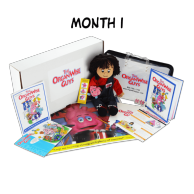Running a marathon seems to be an impossible task for most adults, let alone a kid! We recently caught up with Kay Morris to find out more about an innovative program called Marathon Kids. We think you’ll enjoy her passion for healthy kids as much as we do!
OWG: How did you come to work with Marathon Kids and what’s your role?
Kay: I am the Founder and Executive Director of the organization, which is fifteen years old. We offer a free six month running/walking, nutrition and schoolyard gardening program for 215,000 registered children. I started Marathon Kids as a grassroots initiative in the summer of 1996. Now, with our board, I oversee our national headquarters and program in eight cities: Austin, Dallas, Houston, El Paso, Baltimore, Chicago, Los Angeles and the Navajo Nation. Frankly, I’m an accidental social entrepreneur! I was simply a slow, middle-aged runner who was lucky enough to get expert help from local physical educators, community runners, and a local running store sponsor. Marathon Kids was and continues to be a confluence of good people coming together to restore joyfulness and vitality to elementary aged children who were on the path to sedentary lifestyles.
OWG: So the goal of Marathon Kids is to challenge kids to run 26.2 miles over a period of time. How do you implement the program?
Kay: We collaborate with pubic schools, private schools and home school networks. The leaders and parents receive the Marathon Kids Packet from us and we communicate with and work closely with Marathon Kids leaders and children over a six month period.
OWG: What are some of the positive changes that you’ve seen in kids who are involved in the program?
Kay: We’re an evidence-based program. That means there’s been a two-year study of Marathon Kids by scientist at the University of Texas School of Public Health. The most significant improvements in children are: they develop the habit of more daily minutes for exercise, a significant uptick and shift in their positive athletic self perception and also a significant uptick in their choices to eat healthy foods.
OWG: One of the great challenges we face is getting the message from the school or club into the home. How does your program facilitate that?
Kay: Because our teachers, administrators and volunteers respect the program we provide to their schools, they are a reliable provider of timely information to the parents and children. It is important that the leaders of the school desire to implement a long-term program rather than being mired in a glut of temporary initiatives.

